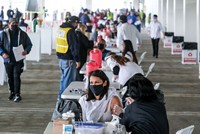Advertisement
Grab your lab coat. Let's get started
Welcome!
Welcome!
Create an account below to get 6 C&EN articles per month, receive newsletters and more - all free.
It seems this is your first time logging in online. Please enter the following information to continue.
As an ACS member you automatically get access to this site. All we need is few more details to create your reading experience.
Not you? Sign in with a different account.
Not you? Sign in with a different account.
ERROR 1
ERROR 1
ERROR 2
ERROR 2
ERROR 2
ERROR 2
ERROR 2
Password and Confirm password must match.
If you have an ACS member number, please enter it here so we can link this account to your membership. (optional)
ERROR 2
ACS values your privacy. By submitting your information, you are gaining access to C&EN and subscribing to our weekly newsletter. We use the information you provide to make your reading experience better, and we will never sell your data to third party members.
Biological Chemistry
Walking The Line
Finding a balanced media response to setbacks in AIDS vaccine research
by Lisa M. Jarvis
December 1, 2008
| A version of this story appeared in
Volume 86, Issue 48

FOR THOSE WORKING on the front lines of the global AIDS epidemic, the opening of the International AIDS Vaccine Initiative's (IAVI's) new labs in Brooklyn, N.Y., last month should have been a moment of unfettered joy. A veritable who's who of the AIDS vaccine community gathered to listen to a scientific symposium and to celebrate a new center where ideas can be nurtured, know-how shared, and a solution to a global epidemic developed.
But when a group of journalists sat down with scientists and clinicians after the symposium, the conversation kept turning to the infamous failure of the Merck & Co. vaccine.
A year earlier, interim results from a large trial of Merck's adenovirus-5 vaccine, which at the time was considered to be the most promising immunotherapy in development, showed it did not offer protection from HIV. Worse, data suggested the vaccine might even raise the risk of contracting HIV in certain subsets of patients. The reporters in Brooklyn wanted to know: Was the Merck failure putting pressure on funding for AIDS vaccines? Would regulatory agencies even allow new vaccines to be tested in humans anytime soon?
Clearly well versed in responding to this line of query, the panelists patiently discussed the post-Merck climate for AIDS vaccine research. They acknowledged the impact of the failure and underscored progress in other areas of research. But by the end of the press conference, there was an undercurrent of frustration.
As a reporter, I felt conflicted. It's my job to get to the bottom of things, and in this case I needed to communicate how Merck's results were impacting both the funding and direction of AIDS vaccine research. But it is also easy to get wrapped up in a juicy story of failure and neglect to ask if there's a reasonable way forward. It's easy to forget that in the best of scientific endeavors, failure isn't regarded as an end but as a better informed beginning.
Many journalists covering the Merck story last year forgot this. The coverage in mainstream publications suggested scientists were back to square one, a claim IAVI's chief executive officer, Seth F. Berkley, calls "patently wrong." On the contrary, he says, "we've learned an enormous amount" about the immune system, viral vectors, and animal models both during and since the trial. "It does mean we're going back to answering some basic questions," he concedes. "But we don't feel rudderless."
In fact, Berkley points out that the AIDS vaccine community had moved on even before the Merck results were aired. Vaccines to control HIV were being refined, and IAVI had already shifted its focus to neutralizing antibodies, a strategy involving crippling the force field the virus uses to protect itself from attack.
"There are now three or four cell-mediated immunity candidates in monkeys that have done significantly better than earlier candidates," Wayne Koff, IAVI's senior vice president of R&D, told me at the symposium. Further, he said, early studies of neutralizing antibodies suggest they are highly potent.
Yet despite the progress, researchers are concerned that regulatory agencies are going to pull back and be overly cautious about okaying human studies of AIDS vaccines. Some scientists at the IAVI event said they've already seen it happening.
All this makes me wonder whether the media's focus on the negative contributed to what is clearly a more challenging climate for AIDS vaccine research. True, the Merck failure was a disappointment, but the media reaction seemed overboard. This spring, an article in the Washington Post quoted Robert C. Gallo, who codiscovered HIV, as comparing the vaccine failure to the Challenger disaster, the 1986 space shuttle explosion that caused National Aeronautics & Space Administration to suspend its shuttle program for nearly three years.
From a reporter's perspective, Gallo's remark made for a great sound bite, one I surely would have been happy to use. But Berkley believes Gallo and other researchers quoted in the press were primarily voicing their disappointment at the setback, not suggesting the field was dead. Perhaps those scientists would have done well to be a little less colorful with their analogies.
PERHAPS MOST DISCONCERTINGLY, the news stories made it seem as if the failure was the end of the line. Drugs fail. No one knows this better than big pharma companies, which routinely jettison drugs that seem promising in a test tube, show a signal in an animal, and then turn out to be toxic or simply don't work. Indeed, drugmakers like to say they are taking "multiple shots on goal" by simultaneously developing several candidates to treat a particular disease. Why? Because nearly all of those shots miss.
In the case of AIDS vaccines, there have been two major trials and two failures, Berkley points out. A disappointment, to be sure, but not grounds for dismissing an entire scientific strategy, as last year's headlines seemed to suggest.
The danger, as I see it, is that the public will lose interest in the AIDS vaccine, particularly given the misguided perception in the Western world that AIDS is no longer a death sentence but rather a chronic disease. It's true that people with access to antiretroviral drugs can live long, productive lives. But AIDS is still wiping out millions of people in Africa, and there are pockets of drug resistance in the U.S. that should give everyone pause.
"One of the challenges in a time of trouble—whether it is fiscal, disappointing trial results, or needs in other sectors—is that people tend to give up prevention and worry about treatment," Berkley says. "If you only have that short-term view, you'll be dealing with people dying forever as opposed to creating tools to treat an epidemic."
Views expressed on this page are those of the author and not necessarily those of ACS.






Join the conversation
Contact the reporter
Submit a Letter to the Editor for publication
Engage with us on Twitter